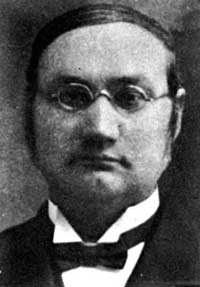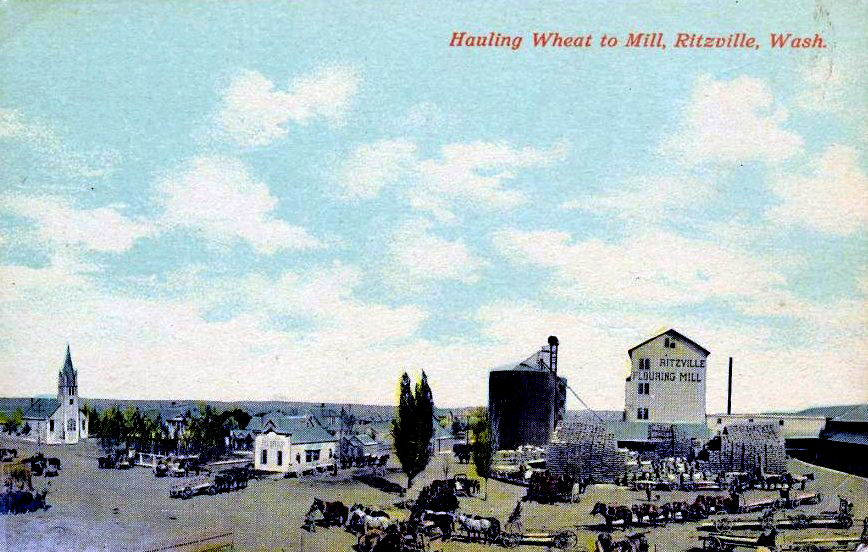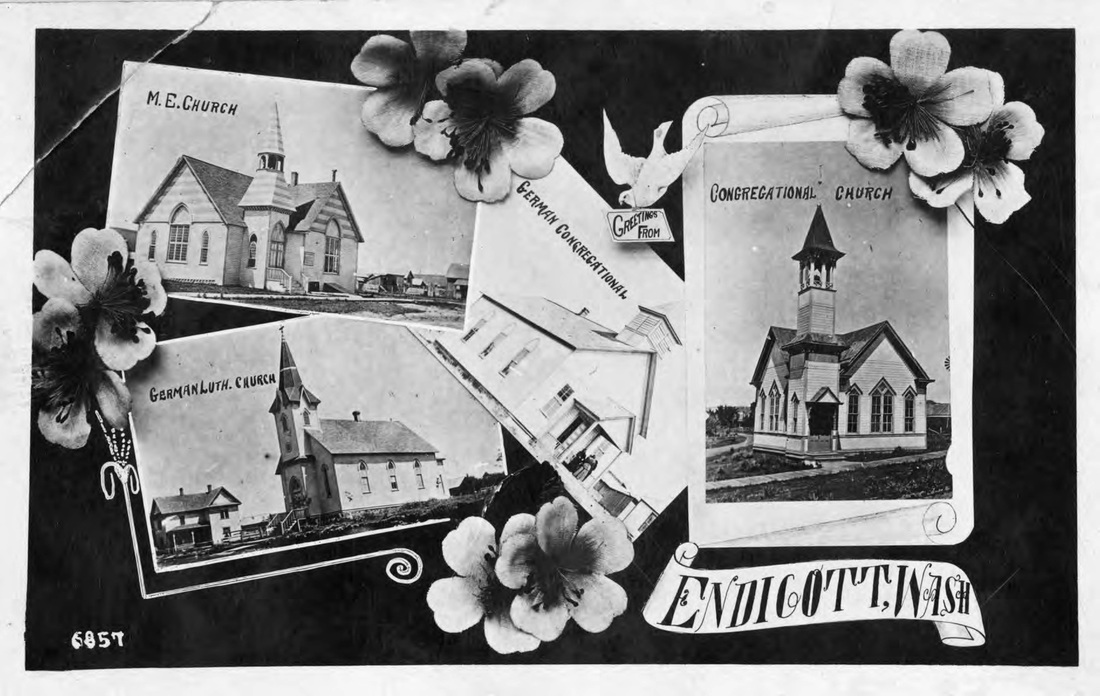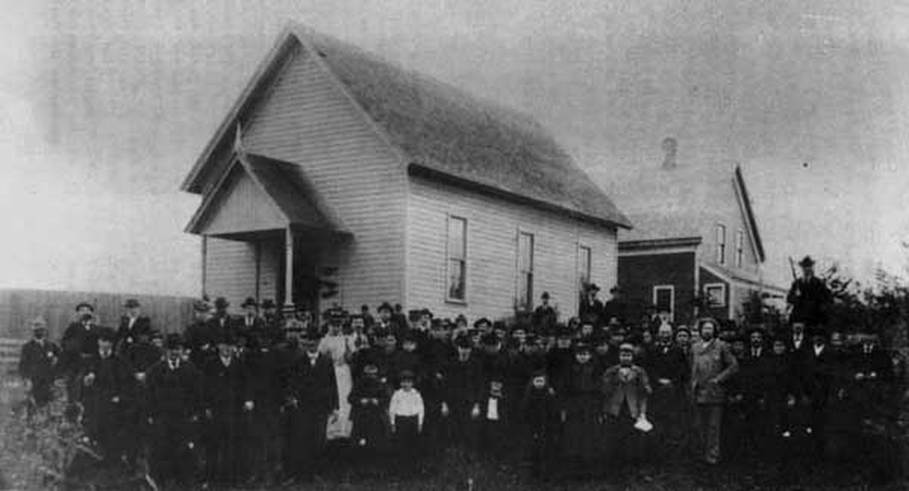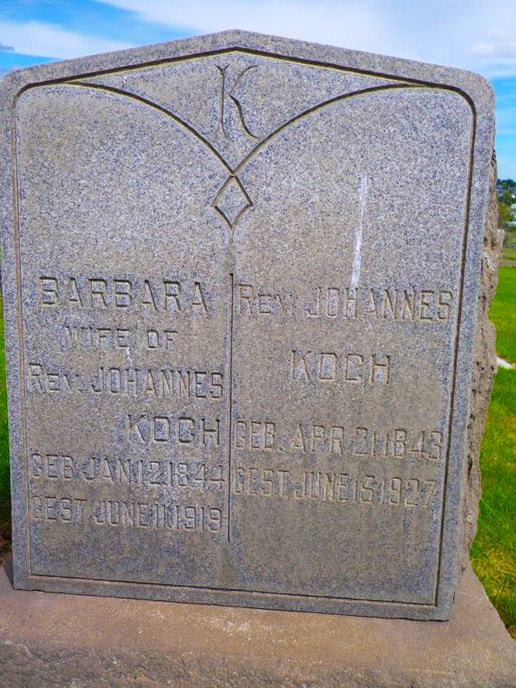Johannes Koch
Johannes (John) Koch was born in Kolb, Russia, on April 21, 1843. His parents were Michael Koch and Elisabetha Reiber.
In 1863, Johannes married Barbara Koch (born January 12, 1844) from the colony of Frank, Russia. They had seven children from their marriage.
Koch served as a schoolteacher in the German colonies along the Volga River, but it was said that he was "a consecrated God-fearing soul, full of faith and the spirit of the Lord was upon him." This strong faith would take his life in another direction.
Koch, along with Rev. Wilhelm Stärkel from Norka and the evangelist Heinrich Peter Ehlers, became the three principal leaders of the Brotherhood (also Brethren) movement amongst the Volga colonists. Rev. Stärkel organized the first Brethren conference held in Brunnental, Russia, in 1871. At this conference, H.P. Ehlers and Johannes Koch were elected evangelists, and Koch was designated a colporteur. All three men were part of a committee to draft the first Brüder-Konstitution (Brotherhood Constitution). Ehlers, Koch, and Rev. Stärkel were also ardent Millennialists and took an active role in the Zionist movement of their day, lecturing on its behalf and supporting it financially. George Eisenach characterizes the trio as "fanatic in their support of this doctrine."
In 1863, Johannes married Barbara Koch (born January 12, 1844) from the colony of Frank, Russia. They had seven children from their marriage.
Koch served as a schoolteacher in the German colonies along the Volga River, but it was said that he was "a consecrated God-fearing soul, full of faith and the spirit of the Lord was upon him." This strong faith would take his life in another direction.
Koch, along with Rev. Wilhelm Stärkel from Norka and the evangelist Heinrich Peter Ehlers, became the three principal leaders of the Brotherhood (also Brethren) movement amongst the Volga colonists. Rev. Stärkel organized the first Brethren conference held in Brunnental, Russia, in 1871. At this conference, H.P. Ehlers and Johannes Koch were elected evangelists, and Koch was designated a colporteur. All three men were part of a committee to draft the first Brüder-Konstitution (Brotherhood Constitution). Ehlers, Koch, and Rev. Stärkel were also ardent Millennialists and took an active role in the Zionist movement of their day, lecturing on its behalf and supporting it financially. George Eisenach characterizes the trio as "fanatic in their support of this doctrine."
Johannes Koch arrived in the United States around 1882 and soon found many former Volga German countrymen in Eastern Washington, where they found work with the railroads. Koch founded the First Congregational Church in Ritzville, Washington, where he served from 1882-1891.
Koch also established the Evangelical Lutheran Congregational Church in Endicott, Washington, and served as pastor from 1883-1893. Koch was ordained at the church in Endicott through an interpreter since he could not speak English. At that time, there were only three English-speaking ministers in Eastern Washington.
Both churches were accepted into the German Congregational Church along with their pastor. From this beginning the Pacific German Congregational Conference was established in 1897.
Rev. Koch also organized churches in Packard and Ralston, Washington (both near Ritzville) and conducted services at all three churches for several years.
Given that many people in Portland had known Koch as an evangelist in Russia, it is clear why he was called to establish the Ebenezer German Congregational Church in 1892, the mother church of the Volga Germans in Portland.
Rev. Koch also organized churches in Packard and Ralston, Washington (both near Ritzville) and conducted services at all three churches for several years.
Given that many people in Portland had known Koch as an evangelist in Russia, it is clear why he was called to establish the Ebenezer German Congregational Church in 1892, the mother church of the Volga Germans in Portland.
The following excerpt is taken from a letter dated February 6, 1893, in which Rev. Koch depicts the religious life of his Volga German congregation in Portland:
"We have not had a single evening without a meeting since Christmas. Last week our Brethren felt that the evenings would no longer suffice. We therefore had meetings in the houses hither and thither, beginning at nine o’clock every morning and closing at nine o’clock at night. People who were considered to be beyond the reach of grace have been carried along by the power of the revival. Old perverse sinners, drunkards and hardened men, down to children of fifteen, have been reached and have humbly sought forgiving grace. Last Sunday we had reception of members. The church was packed full. Forty-eight converts gathered about the altar. All freely confessed Christ as their only Savior, after a very searching address. Then they were strongly exhorted to steadfastness in the Christian life and the Apostolic Confession of Faith was read to them, to which they all responded with a loud ‘yes.’ Then while the church sang the hymn:
‘To each other we give in covenant
The faithful fraternal hand,’
I gave to each the right hand of fellowship. Then all went down on their knees, sometimes a half-hour at a time. Every man wanted to thank the Lord that he had sought him and found him and given him his hand of fellowship… Thus the work goes on. God be praised!"
After serving at Ebenezer, Pastor Koch again led the First Congregational Church in Ritzville (1893-1895) and the Zion Congregational Church in the same town (1893-1894). After serving in Ritzville, Rev. Koch returned to the Ebenezer church in Portland. During the same period, he served the church in Stafford, Oregon (1895-1899). He later went to serve the Salem Church in Ralston, Washington (1899-1904).
Rev. Koch's father, Michael, died in 1908 in Lind, Washington, at the age of 103, and his Barbara Koch died on June 11, 1919.
Rev. Koch died in Ritzville, Washington, on June 15, 1927. He was buried in the Ritzville Cemetery along with his wife, Barbara.
Rev. Koch's father, Michael, died in 1908 in Lind, Washington, at the age of 103, and his Barbara Koch died on June 11, 1919.
Rev. Koch died in Ritzville, Washington, on June 15, 1927. He was buried in the Ritzville Cemetery along with his wife, Barbara.
Sources
Chrystal, William G. "German Congregationalism." Hidden Histories In The United Church Of Christ - Volume 1. United Church of Christ. Web. 13 June 2015. <http://www.ucc.org/about-us_hidden-histories>.
Eisenach, George J. Pietism and the Russian Germans in the United States. Berne, IN: Berne, 1948. Print.
Ebenezer Congregational Church Seventy-Five Years 1892-1967. Portland, OR: Ebenezer Congregational Church, 1967. Print.
Home Missionary, April 1893, pp. 577-579.
Ancestry.com
Eisenach, George J. Pietism and the Russian Germans in the United States. Berne, IN: Berne, 1948. Print.
Ebenezer Congregational Church Seventy-Five Years 1892-1967. Portland, OR: Ebenezer Congregational Church, 1967. Print.
Home Missionary, April 1893, pp. 577-579.
Ancestry.com
Last updated October 23, 2023
